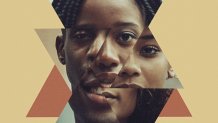The year was 2019 and Binta Diallo was looking for a partner. To be more specific, Diallo, 30, was looking for a potential husband. In that pursuit, the young Muslim woman from West Africa did what many Millennials do. She went online.
But instead of romance and love, Diallo only found pain and rejection. And she says it was in no small part because she was dark-skinned. Colorism, a prejudice or discrimination against individuals with a dark skin tone, plays a role in most communities of color. But Diallo says the issue is particularly pervasive in the Muslim community. For that reason, she found herself not often coveted by male suitors.
"For me, primarily when I was speaking with someone, sometimes I could tell they didn't really want to utilize me as a wife. They would rather me just be kind of like on the side, or someone not really worth marrying," she said. "It's still difficult to talk about."
So Diallo took matters into her own hands. In April 2020, she and a fellow Millennial were tired of "swiping left and right" with no good match to be found. While staying home during the COVID-19 outbreak, they created a space for Muslim men and women to meet online, and "Eye Meets Soul" was born.
But there's a twist — it's a blind matchmaking service. Suitors don't get to see the faces of potential matches until they find themselves several rounds of conversation into the process. "We wanted to know if we could indeed find out if love was blind," she says.
This is how Eye Meets Soul works. Interested parties apply on the site, answer a few questions, and then are interviewed by Diallo and her partner. Then a group of men and women are selected to be placed in a virtual "blind" Zoom room.
"Sometimes there might be 20 people. So within that group, we meet [virtually] either for a weekend or over the course of five days, depending on how we want to structure it," she says. "And they meet with two people a day. And at the end of the experience, they are able to let us know who the top picks are and if their top picks match, they get each other's information."
But even with the "blind" feature, Diallo has noted instances of racism and colorism creep into the process. "We did notice even though people couldn't see each other, they still were utilizing certain bias or thoughts they had around a specific race. We had someone tell us they didn't want to speak to another participant because they belonged to a particular race. So that was really terrible," Diallo said.

Battling Colorism on Dating Apps
Racism on dating apps has been long acknowledged. Research done by OKCupid co-founder Christian Rudder found if you’re a Black man or woman or Asian man, you’re going to have a tougher time getting a date on OKCupid. Rudder examined millions of OKCupid interactions between 2009 and 2014 involving more than 25 million people and mapped out the racial and gender preferences he found.
A new book, “The Dating Divide: Race and Desire in the Era of Online Romance” draw on large-scale behavioral data from a mainstream dating website, extensive archival research and more than 75 in-depth interviews with daters of diverse racial backgrounds and sexual identities. That research determined the open space of the internet combined with the loss of social inhibition in cyberspace fostered openly expressed forms of sexual racism that were rarely exposed in face-to-face encounters.
Muslims, a community that consists of people from the lightest of shades to the darkest of hues, have long had to deal with issues of colorism on dating apps.
Margari Hill is the executive director of the Muslim Anti-Racism Collaborative. In this capacity, Hill has studied the issue of colorism and its impact on communities of color.
"It's definitely pervasive within most people of color communities. That's what's really troubling about it," Hill says. "But at the same time in the Muslim community, it's how it shows up. It definitely betrays some of our faith values when you're valuing people based on skin tone and complexion."
Hill said this is often represented in the way some Muslim men discuss skin tone and how they intertwine the concept of beauty and white skin.
"Those regimes also exist within the Latin American or Latino communities and Asian communities," Hill says. "The thing is Muslim identities intersect with all of those. There are Muslim South Americans and Latino Muslims."
For example, Hill took note of the excessive number of skin lighteners and bleaching creams targeted toward Muslim women of color across the globe. "You also look at some of the Pakistani bridal magazines and you see almost everybody within a certain type of skin tone. And they tend to be on the lighter spectrum. And there are many dark-skinned Pakistani women and men," Hill notes. "But then you'll often hear expressions like 'Don't go out in the sun.' Even this perception of looking like somebody from Bangladesh is negative because Bangladeshi tend to be darker-skinned."
That's just a small example of the backward thinking that Diallo found herself contending with. But through Eye Meets Soul she says she's doing her small part to combat the problem. And although her website only currently caters to a very small clientele, Diallo is ecstatic that she's already made a love match.
"One of the couples, actually about a week ago, they got engaged and they've met each other's families. So they should be getting married," she said. "We're really just trying to get people to dig deeper and think. This allows us to challenge our thought processes and also challenge what we may have learned growing up and what every society has told us is beautiful."
Video and additional reporting by Fernando Hurtado

